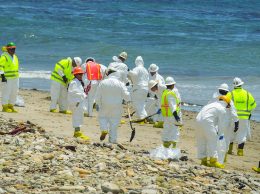Opinion: ExxonMobil’s oil trucking plan in Santa Barbara County is dirty and dangerous
By Linda Krop
On Sept. 29, the Santa Barbara County Planning Commission will consider ExxonMobil’s proposal to restart its three platforms offshore from Gaviota and truck its oil along highways 101 (to Santa Maria) and 166 (to Pentland, in Kern County). Last year, the county planning staff recommended against allowing tanker trucks on the windy and narrow Highway 166 due to concerns about accidents and oil spills. This year, however, the staff is recommending approval, given the expected shutdown of the Santa Maria facility.

The Environmental Defense Center joins numerous local organizations and businesses, as well as the cities of Goleta and Santa Barbara and the Cuyama Joint Unified School District, in opposing ExxonMobil’s project because it would put our community at risk from offshore and onshore oil spills, tanker truck accidents, air and water pollution, and increased climate change.
Just last year an oil tanker truck crashed on Route 166, spilling 4,500 gallons of crude oil into the Cuyama River upstream from Twitchell Reservoir, polluting the water and threatening wildlife.
ExxonMobil’s proposal is contrary to the interests of the county and its residents. First, allowing ExxonMobil to produce oil and gas will exacerbate the current climate crisis. According to the county’s Environmental Impact Report, the project — including restart of the platforms and associated facilities — will generate 317,043 metric tons of carbon emissions per year, or the equivalent of about 69,000 cars.
Santa Barbara County already faces the devastating effects of climate change, as experienced through more destructive wildfires, droughts, sea level rise, and more. We simply cannot continue producing and consuming fossil fuels. Instead, we need to transition to clean sources of energy.
Second, allowing ExxonMobil to restart the offshore oil platforms and the Las Flores Canyon processing plant will generate a host of other unacceptable risks and impacts, including the threat of another major oil spill, as well as impacts to air and water quality, marine wildlife, onshore natural and cultural resources, birds, fishing, recreation, and public safety.
Moreover, these oil platforms have a history of unconventional drilling practices, such as fracking and acidizing, which threaten the environment with additional unstudied impacts. We know from the 1969 Santa Barbara oil spill, and the more recent Plains Pipeline oil spill, that such events affect not only the environment, but also our regional economy.
Finally, ExxonMobil’s proposal to truck crude oil will put our communities and environment at great risk of accidents and spills. The project would permit 173,740 full truck trips, as well as 347,480 one-way trips, along highways 101 and 166. With each truck carrying 6,720 gallons, more than 1 billion gallons of crude oil could be transported over the life of the project.
The Environmental Impact Report determined that the risk of an oil spill from trucking is unavoidable. In fact, at least 79 tanker truck crashes have occurred in California in the last 21 years, including 12 in Santa Barbara County. These accidents left 56 people injured and 28 people dead.
The risks of oil trucking on Highway 166 were acknowledged by county staff in August 2020, when the staff recommended against allowing trucking to Pentland. Trucking along Highway 101 should also be denied because of the significant risk of an accident and oil spill along the scenic Gaviota Coast, across numerous coastal watersheds and next to the Pacific Ocean, and through the dangerous Gaviota curve and tunnel. These areas include important Indigenous lands and sensitive wildlife habitat. A spill along this route would have a devastating effect on sensitive cultural and ecological resources.
Now is not the time to turn the clock back and return to our old ways of relying on fossil fuels to meet our energy needs. The county of Santa Barbara is moving towards a clean energy future by adopting renewable energy targets and joining the Monterey Bay Community Power (Community Choice Energy) program. Allowing ExxonMobil to resume oil production off our coast will lead to decades of fossil fuel production that we cannot afford.
Please contact the Santa Barbara County Planning Commission at [email protected], and ask the commissioners to vote NO on the dirty and dangerous ExxonMobil proposal.
• Linda Krop is chief counsel at the Environmental Defense Center, a nonprofit based in Santa Barbara. EDC represents Get Oil Out! and SBCAN in their work to oppose ExxonMobil’s oil trucking plan.











